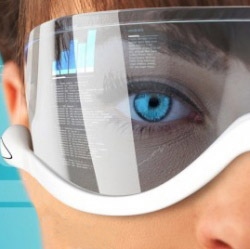
The arrival of Google Glass seems to have changed that. The excitement surrounding the prototype glasses, which let you take photos, send messages, get directions and a whole host of other things, has been extraordinary.
Google Glass is one of a number of emerging wearable technologies that are supposed to change our lives. The debate rages on about just how positive a development this is as computer and person are brought ever closer together.
By comparison, very little has been said about the impact that wearable technologies could have on business. Admittedly it’s early days, but the vast majority of companies are yet to find a use for it.
Recent research by US cloud technology company Rackspace found only 6% of businesses had provided such devices to their staff. But Ved Sen, head of mobility at Cognizant Technology Solutions, thinks all that is about to change.
The range of applications that something like Google Glass alone could have tumble from him.
"Imagine the man fixing the boiler. He lying under a heavy device and he needs his hands, but he can still be in a computing environment.
"Take a sales person walking into a client’s office; they might be able to access instant information in front of their eyes. ‘What was the last order this company placed? Are they happy with us?’ Even ‘when was the client’s last birthday?’ " he says.
But the applications don’t stop with hi-tech glasses.
"Let’s suppose I’m a manager of a large facility," Mr Sen continues.
"As I walk around, I have something in my shoe and as I pass certain devices that could read whether a device is fine and if it isn’t it will tell me – perhaps by buzzing."
However, he denies that the technology, particularly in cases like that of the salesman, will simply facilitate less preparation and even laziness.
"I’m not saying we should dumb down the individual but instead give them the kit to access information when they want to," he says.
"This is about improving our ability to engage with our surroundings."
